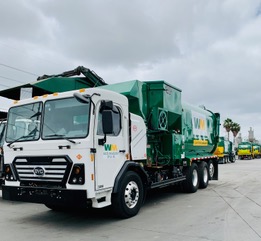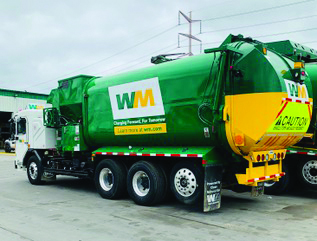WM, formally known as Waste Management, has released its first fully electric trash collection truck to service recycling and trash routes in Laguna Beach. The city was selected to receive WM’s first electric trash truck in Orange County because Laguna “exemplifies WM’s commitment to environmental stewardship and innovation.”

“This launch aligns directly with WM’s commitment to incorporate technology and innovation in our fleet for a more sustainable tomorrow,” said Muyisa Kasomo, speaking as a WM representative at the June 27 city council meeting. “It also aligns with Laguna’s commitment to the environment.”
WM’s Irvine Hauling Fleet Manager Eric Samaya told councilmembers that after testing, the new truck can run for more than nine hours and still end the day at 72 percent battery usage.
“It was picking up (trash) from over 1,200 homes and averaging 13 tons after two loads,” Samaya said. This is really exciting and the future for us.”
The new electric truck, a BYD Class 8 automated side loader, took its first journey from WM’s Irvine yard to Laguna Beach on June 23. WM tested the vehicle for a year before adding it to its fleet.

“At WM, we are driven by a relentless pursuit of innovation and are dedicated to leading the industry in creating a more sustainable environmental services ecosystem,” said Mike Hammer, area vice president of WM of Southern California. “The integration of electric vehicles into our fleet is another step in our sustainability journey and reinforces our commitment to the communities we serve.”
Electric trash trucks produce zero tailpipe emissions, significantly reducing air pollution and enhancing local air quality, especially in densely populated areas. They operate quietly, minimizing noise pollution, and offer the potential of reduced maintenance issues because of fewer moving parts.
WM has a track record of incorporating alternative fuels into its operations, with a focus on natural gas vehicles. Since 2010, the company said it has reduced greenhouse gas emissions attributed to its fleet by approximately 38 percent. This accomplishment is comparable to removing over 150,000 passenger vehicles from the road annually. Building on this foundation, WM stated it has expanded its commitment to alternative fuels by venturing into electric vehicle technologies to understand where it can best serve its customers and communities.
With the introduction of the fully electric collection truck, WM aims to assess the vehicle’s longevity and operational efficiency in Laguna Beach. Its implementation is a step toward incorporating additional electric vehicles into WM’s Southern California fleet.
The electric truck’s deployment overlaps with California’s decision to halt sales of conventional combustion trucks by 2036 and to have all zero-emission medium and heavy-duty trucks in the state by 2045. The truck is one of WM’s efforts to identify the best equipment to use in alignment with the upcoming regulation and contribute to California’s clean energy goals.





Most waste collection is done in the day time. When the electric trash truck gets back to their base of operations at, I presume, around 5:00 PM the operator will plug the truck in to recharge the battery. At that time of day the truck will be charging on fossil fueled electricity and run the next day on must likely natural gas produced energy. Electric trash truck, just another waste of money.